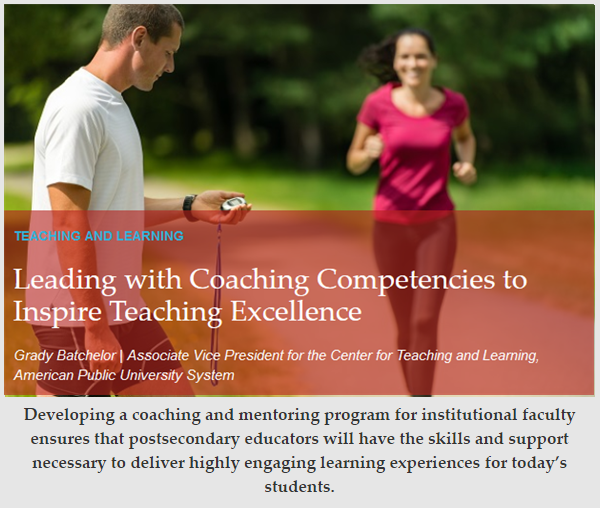Grady Batchelor | Associate Vice President for the Center for Teaching and Learning, American Public University System, Elizabeth Gray, Faculty Training Developer and Coach in the Center for Teaching and Learning, American Public University System and Nancy Heath | Assurance System Writer for Assessment and Accreditation, American Public University System
In late May, the APUS Center for Teaching and Learning (CTL) celebrated International Coaching Week (ICW), highlighting the work of executive coaches, career coaches, life coaches, leadership coaches, relationship coaches and other professional skilled coaches. The aim of ICW, according to the International Coach Federation, was to help educate the public on the value of working with professional coaches.
Across numerous verticals, professional coaching has been shown to create benefits for clients and, looking at our own industry, we realized the capacity for coaching to improve the quality of postsecondary pedagogy was high. After all, it’s often pointed out that faculty tend to come into higher education by way of their research experience and rarely have professional teaching experience or support.
As such, we developed a comprehensive coaching and mentoring initiative aimed at faculty. Our offerings include the following components:
- APUS Certified Professional Coach/Mentor program (CPCM) consisting of three five-week courses designed and developed to provide the knowledge, skills, abilities and experience required to effectively coach/mentor faculty members. All are aligned with the Board Certified Coach and International Coach Federation’s Certified Professional Coach competencies and ethics to position the program for internal/external delivery, recognition, and certification/accreditation.
- Forum Engagement Assessment process consisting of a reporting framework delivered by CTL’s Instructional Specialist team in each school. The framework provides a tool to help focus efforts on the courses and faculty where coaching can have the greatest impact on teaching excellence and increasing student and faculty engagement.
- Core Learning Group Mentoring Community of Practice project consisting of asynchronous and synchronous facilitated group and team sessions. The goal of these sessions is to align efforts associated with student success, increasing retention and persistence, addressing key performance indicators, and challenging faculty to develop new knowledge, skills and abilities.
Our collective goal is to enhance student and faculty engagement in the classroom to maximize student satisfaction, increasing persistence and, ultimately, graduation rates. Professional coaching has been shown to have a positive impact on cultivating leaders, improving communication, increasing productivity, and fostering a positive work environment. It empowers our CTL coaches to model engagement for our faculty members, one-to-one and in groups, as they ask thought-provoking questions designed to inspire teaching excellence and increased faculty to student engagement.
There are five coaching competencies that we are emphasizing in the CPCM program as critical to the process of leading through coaching. Applying these competencies will help our faculty become more efficient and effective, increase faculty and student engagement, and inspire teaching excellence.
1. Set goals. Every session begins with a goal set by the person being coached (the “client”). The coach facilitates goal discovery by the client. The goal-setting process requires a coach to ask the right questions to clarify, align and focus the client’s attention on an appropriate goal to achieve the desired results.
2. Focus on awareness. A coach asks thought-provoking questions that encourage the client to engage to reflect on his/her current situation, thoughts, values and beliefs to gain a deep sense of self-awareness. A focus on self-awareness allows the client to draw conclusions that are more accurate and assists the client to make better-informed decisions.
3. Conduct curious conversations by asking empowering questions. A coach engages the client with intentionally thought-provoking questions that help the client to zero-in on issues, situations, and challenges, reasons for change, desired results, actions, and more. A coach helps the client generate solutions and strategies while analyzing options, empowering them to have a greater understanding of themselves and the current situation.
4. Plan for action. Building on the client solutions, strategies, and options, a coach helps them plan for action to achieve their desired results through identifying and planning for the “who, what, where, why, when and how.” The coach also assists in identifying potential obstacles toward achieving the goal, and potential responses to these anticipated challenges.
5. Hold accountable. Ultimately, holding the client accountable is what sets coaching apart from other helping roles and professions (i.e. counseling, therapy). A coach holds the client accountable for what the client commits to doing and on the timeline the client has identified as appropriate. Being held accountable is central to the client’s success.
An emphasis on leading with coaching competencies is just the most recent in APUS’s continued efforts to foster an academic environment that promotes student and faculty engagement, enhances student learning, reinforces existing retention efforts, and embodies teaching excellence.
Using a coaching framework, and through an ongoing series of “curious conversations,” APUS faculty are empowered to become an active and integral part of the university’s most significant initiatives. At the same time, the coaching approach will solidify and bind together various stakeholders to ensure a collaborative and inclusive approach to supporting teaching and learning at APUS.
Article reposted from http://evolllution.com/programming/teaching-and-learning/leading-with-coaching-competencies-to-inspire-teaching-excellence/
